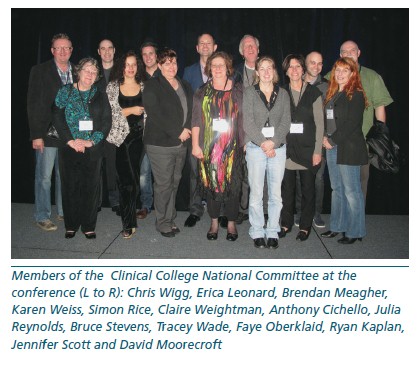The 2011 APS Clinical College Conference was held from 15 to 17 July, 2011 at a captivating resort location in the Sunshine Coast – Hyatt Regency Coolum – which attracted nearly 430 delegates. This was the first Clinical College conference since 2003 and came at a time of many changes occurring within psychology.

Continuing professional development was a major focus for the conference, providing registrants with 18 CPD hours if they attended the three days of the conference. The conference provided knowledge and skills through Workshop presentations and Master Classes, with presenters recognised as leaders in their specialist field. Consequently, conference registrants had great difficulty deciding which Workshops and/or Master Classes they should attend and all were completely booked out.
Three keynote addresses were delivered by APS Presidents past and present. Professor Paul Martin presented on ‘Clinical psychology going forward: National health reform, lessons from the past, the international context and agenda for the future’. Professor Simon Crowe presented on ‘To prescribe or not to prescribe, that is the question’.
Also included in the large presentations was a video address by The Hon Mark Butler MP, Minister for Mental Health and Ageing, which was followed by a discussion with Professor Lyn Littlefield, APS Executive Director.
During lunch on the Saturday the current APS President and the Executive Director chaired a question and answer session for all delegates who had questions they wanted answered by the APS. The next Clinical College Conference will be held in June 2012 in Sydney, NSW.
Fay Oberklaid FAPS, Conference Chair
Clinical Psychology in the Media
Aproactive media campaign was implemented to promote the Clinical College Conference and the College, and to explain how clinical psychologists contribute to the community. Topics across the spectrum of psychological practice, from perfectionism to learning disorders and stalking were covered in the media. More than 150 items relating to the Conference appeared in the media (12 print, 21 radio and 119 online), which reached an estimated audience of 1 million people. The coverage consisted of a mix of news and high quality feature pieces, ensuring wide reach for the conference stories and in-depth discussion of key issues.
Media highlights
- ABC Sunshine Coast’s afternoon show featured a series of interviews with prominent clinical psychologists (Professor Tracey Wade, Professor Mark Creamer, Dr Sally Lock and Tim Hannan) to highlight the conference, aired over four days leading into the event.
- ABC Gold Coast broadcast a segment on its news bulletin about the scale of the conference, the numbers attending and the topics being covered, which featured an interview with Dr Bruce Stevens from the Conference Organising Committee.
- A substantial and widely syndicated news report was produced by AAP on Tim Hannan’s call for early screening for learning difficulties. This appeared in a range of publications, including the Sydney Morning Herald, Canberra Times,
- Adelaide Advertiser, Newcastle Herald and the Daily Advertiser, Wagga Wagga. Tim Hannan was then invited to appear on the ABC Brisbane segment, Ask an Expert, where he spoke with callers about Asperger’s syndrome, dyscalculia and problems with fine motor skills.
- Professor Tracey Wade’s work on perfectionism attracted substantial coverage, with detailed feature articles appearing in the health and wellbeing section of the West Australian, ABC Online, and an opinion piece appearing on the online opinion site, The Punch. Professor Wade also conducted a great number of broadcast interviews, including on ABC 666 Canberra, ABC 774 Melbourne, ABC Newcastle, Radio Adelaide and Sydney’s 2UE.
- Professor Greg Murray was interviewed by the Medical Journal of Australia about psychologists’ role in treating people with bipolar disorder, which resulted in a very targeted feature piece that will assist understanding among medical professionals of the role of psychologists in managing this disorder.
- Dr Peter Cotton appeared on an edition of Radio National Life Matters talking about workplace mental health.
- Dr Deborah Wilmoth was interviewed for a detailed feature in the West Australian about stalking.
Karen Coghlan, Senior Media Coordinator, National Office
Disclaimer: Published in InPsych on October 2011. The APS aims to ensure that information published in InPsych is current and accurate at the time of publication. Changes after publication may affect the accuracy of this information. Readers are responsible for ascertaining the currency and completeness of information they rely on, which is particularly important for government initiatives, legislation or best-practice principles which are open to amendment. The information provided in InPsych does not replace obtaining appropriate professional and/or legal advice.